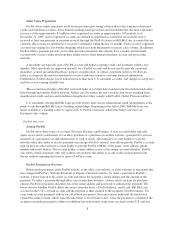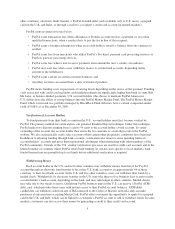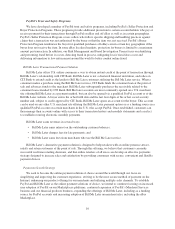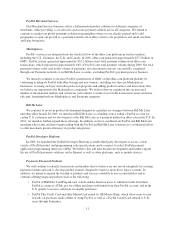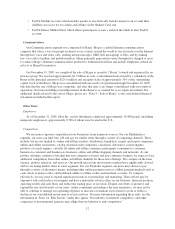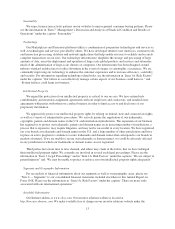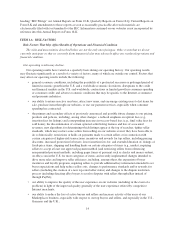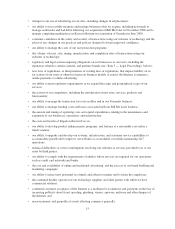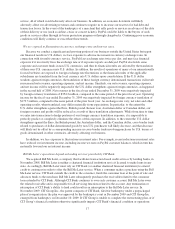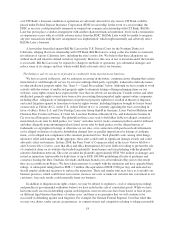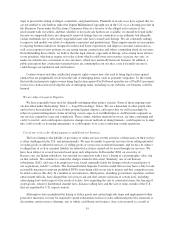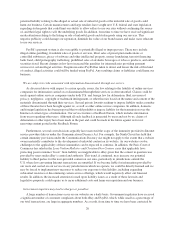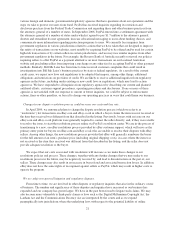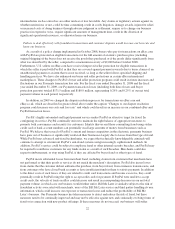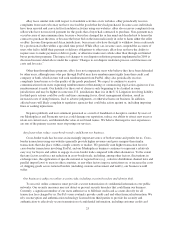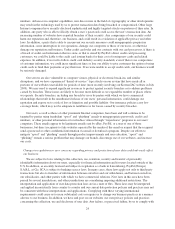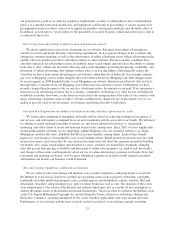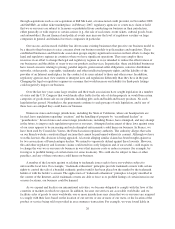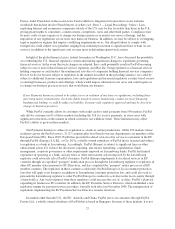eBay 2009 Annual Report Download - page 25
Download and view the complete annual report
Please find page 25 of the 2009 eBay annual report below. You can navigate through the pages in the report by either clicking on the pages listed below, or by using the keyword search tool below to find specific information within the annual report.service, all of which would adversely affect our business. In addition, an economic downturn will likely
adversely affect our advertising revenues and continue to require us to increase our reserves for bad debt and
transaction losses. In the event of the bankruptcy of a merchant that sells goods or services in advance of the date
of their delivery or use (such as airline, cruise or concert tickets), PayPal could be liable to the buyers of such
goods or services either through its buyer protection program or through chargebacks. Continuing poor economic
conditions will likely continue or exacerbate these trends.
We are exposed to fluctuations in currency exchange rates and interest rates.
Because we conduct a significant and growing portion of our business outside the United States but report
our financial results in U.S. dollars, we face exposure to adverse movements in currency exchange rates. In
connection with its multi-currency service, PayPal fixes exchange rates twice per day, and may face financial
exposure if it incorrectly fixes the exchange rate or if exposure reports are delayed. PayPal also holds some
corporate and customer funds in non-U.S. currencies, and thus its financial results are affected by the translation
of these non-U.S. currencies into U.S. dollars. In addition, the results of operations of many of our internationally
focused websites are exposed to foreign exchange rate fluctuations as the financial results of the applicable
subsidiaries are translated from the local currency into U.S. dollars upon consolidation. If the U.S. dollar
weakens against foreign currencies, the translation of these foreign currency denominated transactions will result
in increased net revenues, operating expenses, and net income. Similarly, our net revenues, operating expenses,
and net income will be negatively impacted if the U.S. dollar strengthens against foreign currencies, as happened
in the second half of 2008. Net revenues in the fiscal year ended December 31, 2009 were negatively impacted
by foreign currency translation of $354.2 million, compared to the same period of the prior fiscal year. Operating
income for the fiscal year ended December 31, 2009 was negatively impacted by foreign currency translation of
$179.3 million, compared to the same period of the prior fiscal year. As exchange rates vary, net sales and other
operating results, when translated, may differ materially from expectations. In particular, to the extent the
U.S. dollar strengthens against the Euro, British pound, Korean won, Australian dollar or Canadian dollar, our
foreign revenues and profits will be reduced as a result of these translation adjustments. While from time to time
we enter into transactions to hedge portions of our foreign currency translation exposure, it is impossible to
perfectly predict or completely eliminate the effects of this exposure. In addition, to the extent the U.S. dollar
strengthens against the Euro, the British pound, the Australian dollar, and the Canadian dollar, cross-border trade
related to purchases of dollar-denominated goods by non-U.S. purchasers will likely decrease, and that decrease
will likely not be offset by a corresponding increase in cross-border trade involving purchases by U.S. buyers of
goods denominated in other currencies, adversely affecting our business.
In addition, we face exposure to fluctuations in interest rates. For example, recent reductions in interest rates
have reduced our investment income, including income we earn on PayPal customer balances, which in turn has
materially lowered our net interest income.
Bill Me Later’s operations depend on lending services provided by CIT Bank.
We acquired Bill Me Later, a company that facilitates transaction-based credit services by lending banks, in
November 2008. Bill Me Later is neither a chartered financial institution nor is it licensed to make loans in any
state. Accordingly, Bill Me Later must rely on CIT Bank (or another chartered financial institution) to extend
credit to customers in order to offer the Bill Me Later service. When a consumer makes a purchase using the Bill
Me Later service, CIT Bank extends the credit to the consumer, funds the consumer loan at the point of sale and
advances funds to the merchant. Bill Me Later subsequently purchases the receivable related to the consumer
loan extended by CIT Bank. Although CIT Bank continues to own each customer account, Bill Me Later owns
the related receivable and is responsible for all servicing functions related to the account. Any termination or
interruption of CIT Bank’s ability to lend could result in an interruption to the Bill Me Later service. In
November 2009, CIT Group Inc., the parent company of CIT Bank, filed for bankruptcy under a prepackaged
plan of reorganization, the plan was approved by the bankruptcy court in December 2009 and CIT Group Inc.
emerged from bankruptcy on December 10, 2009. If CIT Group is unable to complete the restructuring plan, or if
CIT Group’s financial condition otherwise significantly impairs CIT Bank’s financial condition or operations
17



